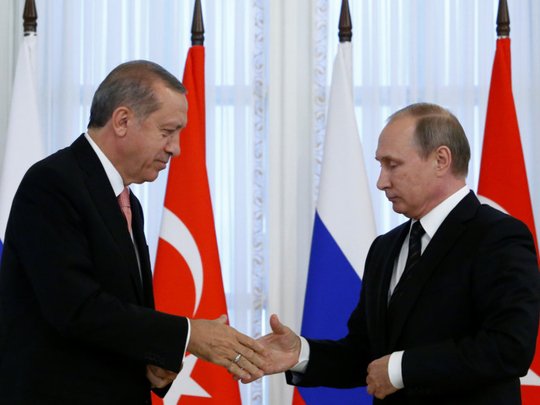
Beirut: The all-out war that erupted this week in Hassakeh in the far north-eastern corner of Syria, took all regional players by surprise — except perhaps for Recep Tayyip Erdogan, Vladimir Putin, and Bashar Al Assad.
Originally triggered by petty clashes between government-backed militias and Kurdish police on August 17, the showdown snowballed into a full-fledged military confrontation as the Syrian Air Force began bombing Hassakeh, marking the first major confrontation between Kurdish militias and government forces since the Syria War erupted five years ago.
Until last week the two sides had been relatively at peace with each other, sometimes even collaborating to fight Daesh, and seeing a common enemy in neighbouring Turkey.
The US-backed Kurdish militias, known as the People’s Protection Units (YPG), have been in-control of most of north-eastern Hassakeh since 2015.
They are the armed forces of Syrian Kurdistan, estimated at no less than 50,000 fighters.
Turkey sees them as terrorist organisation, not very different from the PYD, the Syrian branch of the Kurdistan Workers Party (PKK), which has been accused of being behind most of the recent terror attacks in Turkey.
Eradicating both groups, along with the Syrian Democratic Forces (founded in Hassakeh last October) has been a high priority for President Erdogan.
It has also strained his relations with Washington DC, which officially supports the YPG.
The US has sent warplanes to prevent the continued attacks on Hassakeh by the Syrian Air Force, which so far has wounded thousands of Syrian Kurds and killed no less than 22 people.
The US helped the YPG fight Daesh in the town of Kobani two years ago, lying south of the border with Turkey, and have repeatedly made airdrops of arms, medicine, and aide to the Kurdish militias.
While a spokesman for the Pentagon expressed concern over the latest escalation, Moscow, Damascus, Tehran — and Ankara, have either welcomed the surge or remained silent about it.
During the latest Russian-Turkish summit in St Petersburg on 9 August, Erdogan explicitly requested Moscow’s support in eradicating the Kurdish threat on his borders with Syria.
In return for abandoning all three Kurdish militias, Putin wants his Turkish counterpart to facilitate the recapturing of Aleppo and part ways with his armed proxies in the Syrian north.
Last January the Russians had insisted on including the PYD in the UN-mandated peace talks in Geneva, much to the displeasure of Ankara.
That demand has now been waivered and Putin will likely shut down their official branch in Moscow, which was opened just last February.
Turkish Prime Minister Binali Yildirim emerged this weekend, saying his country will play a more active role in the Syria conflict “within the next six months” aimed at preventing the division of Syria “along ethnic lines.”
This means preventing the emergence of a Kurdish state in towns like Qamishli and Hassakeh.
Addressing the Turkish Parliament, he said: “Turkey rejects the partition of Syria into pieces and refuses the creation of a Kurdish state between Turkey and the rest of the countries of the Middle East.”
Since entering the Syrian battlefield last September, Russia armed Kurdish militias in Hassakeh especially after Turkey downed one of its fighter jets in November.
They were used by Damascus and Moscow to send shivers down the spine of Turkish officialdom.
The YPG denies receiving Russian arms but does not hide its affiliation with the United States.
If sidelined by the Russians to please the Turkish President, this will empower Salafi militias who often fought uphill battles with the Kurds.
In battle the Kurds have proven a very effective fighting force especially against Al Qaida and Daesh.
Earlier this summer, they refused to take up arms against Daesh in the town of Albu Kamal on the Euphrates River.
Instead they helped Daesh round up and kill or arrest US-trained parachuters from the newly created New Syrian Army.
Although never on good terms with the government in Damascus, many Kurdish players worked silently with it, furious with Turkey’s endorsement of the Syrian Opposition since 2011.
That secret understanding has now been waived by Putin, who sees Turkish cooperation at this stage more vital for Russian interests than Kurdish ambitions of statehood.












